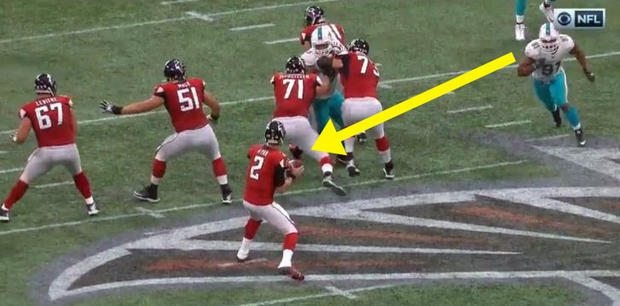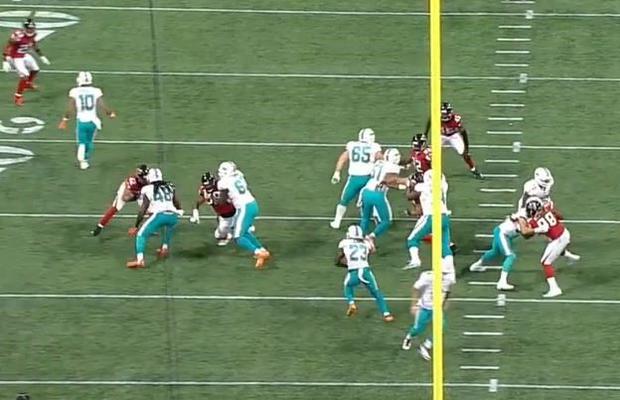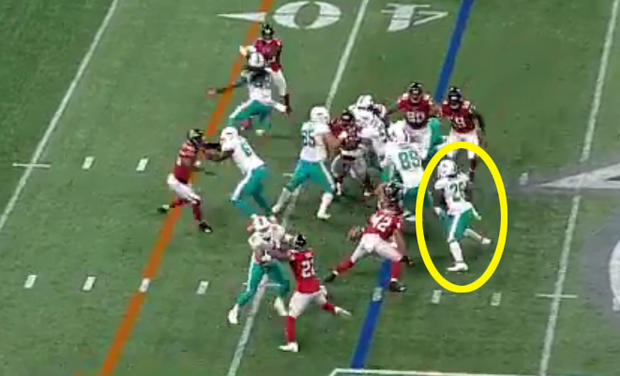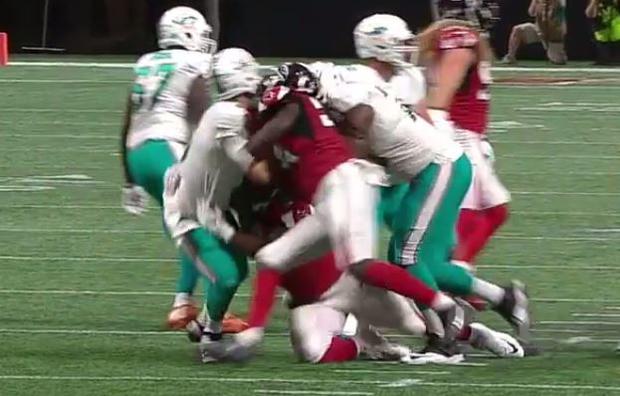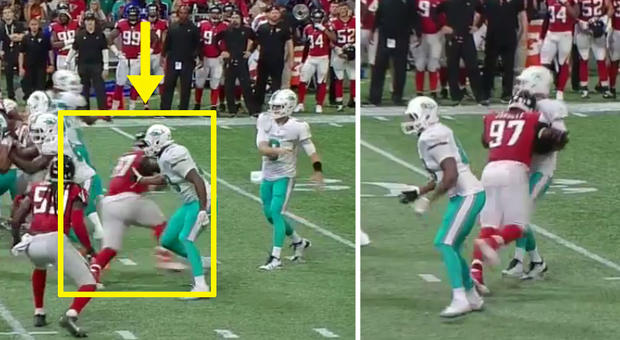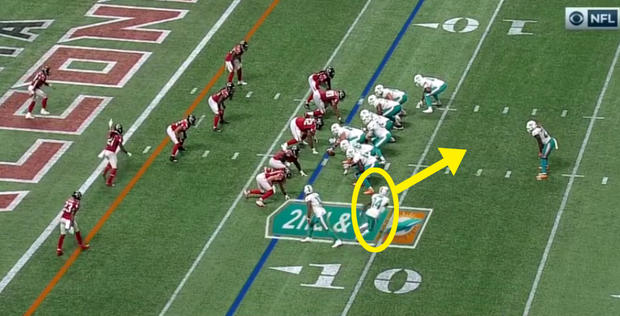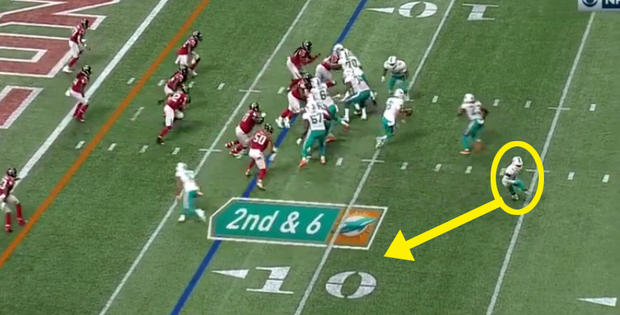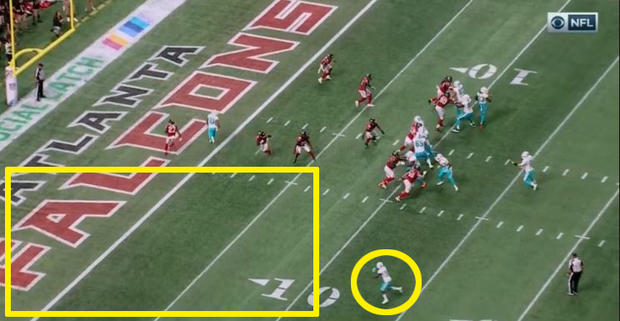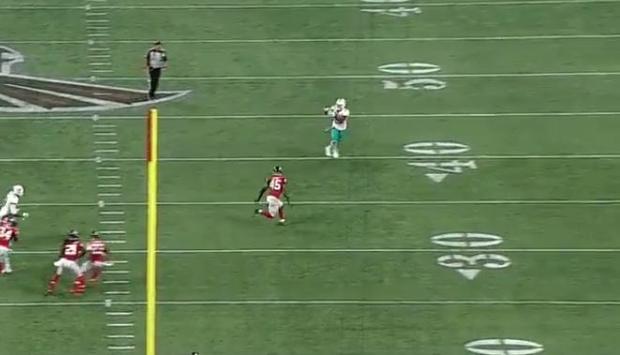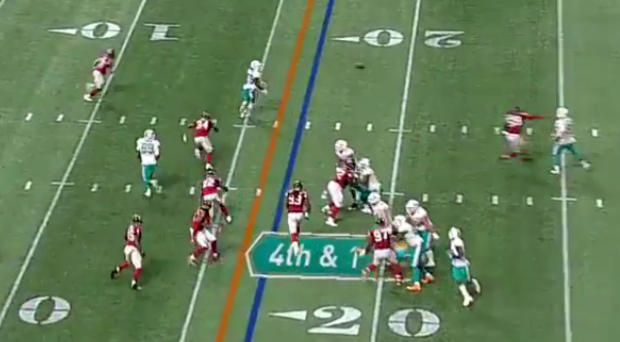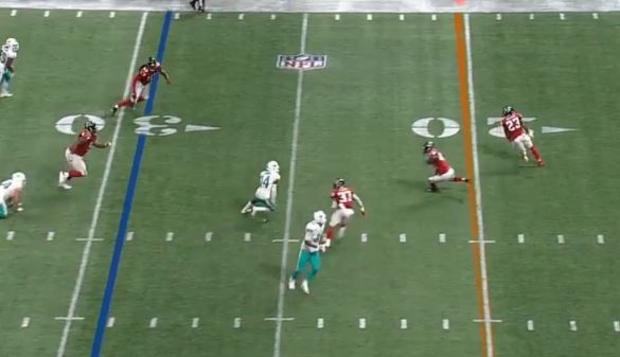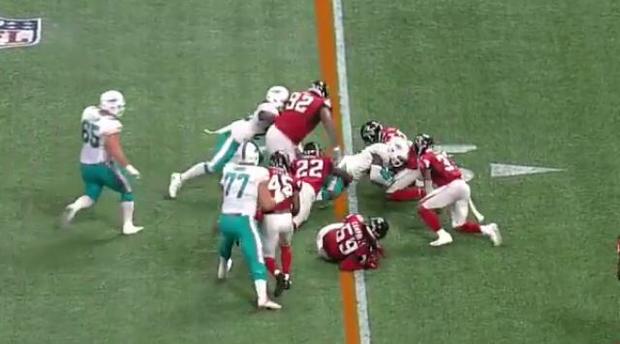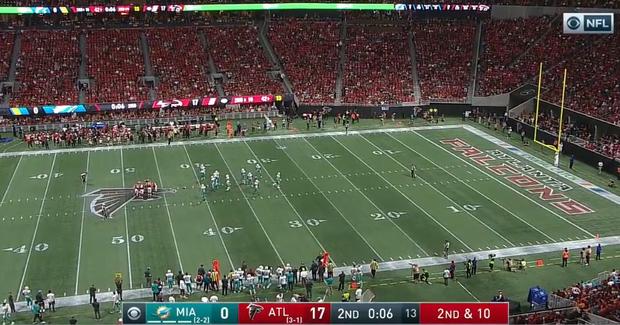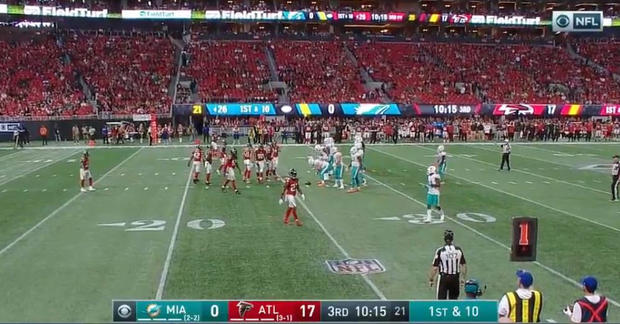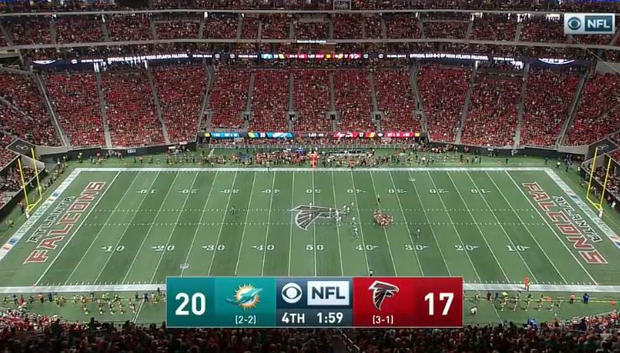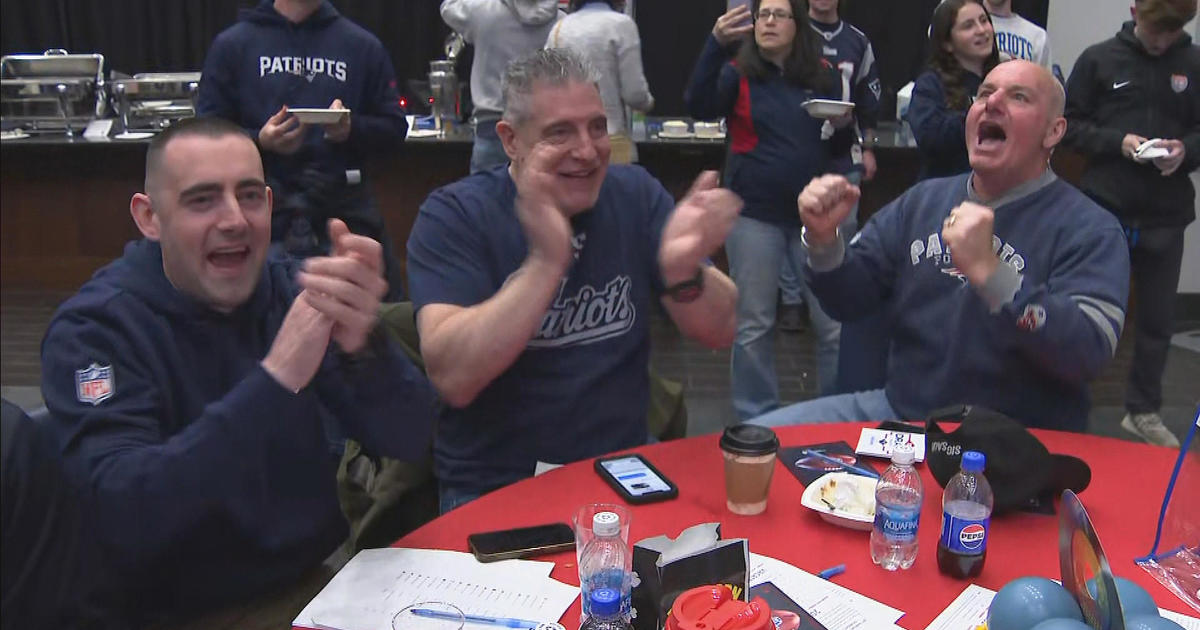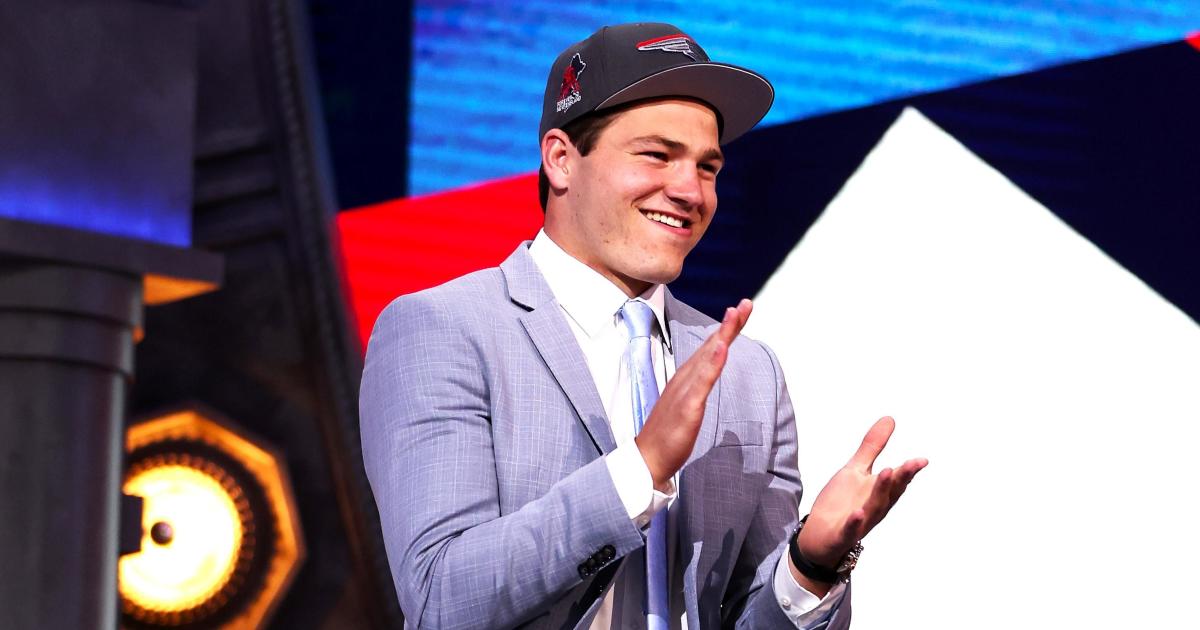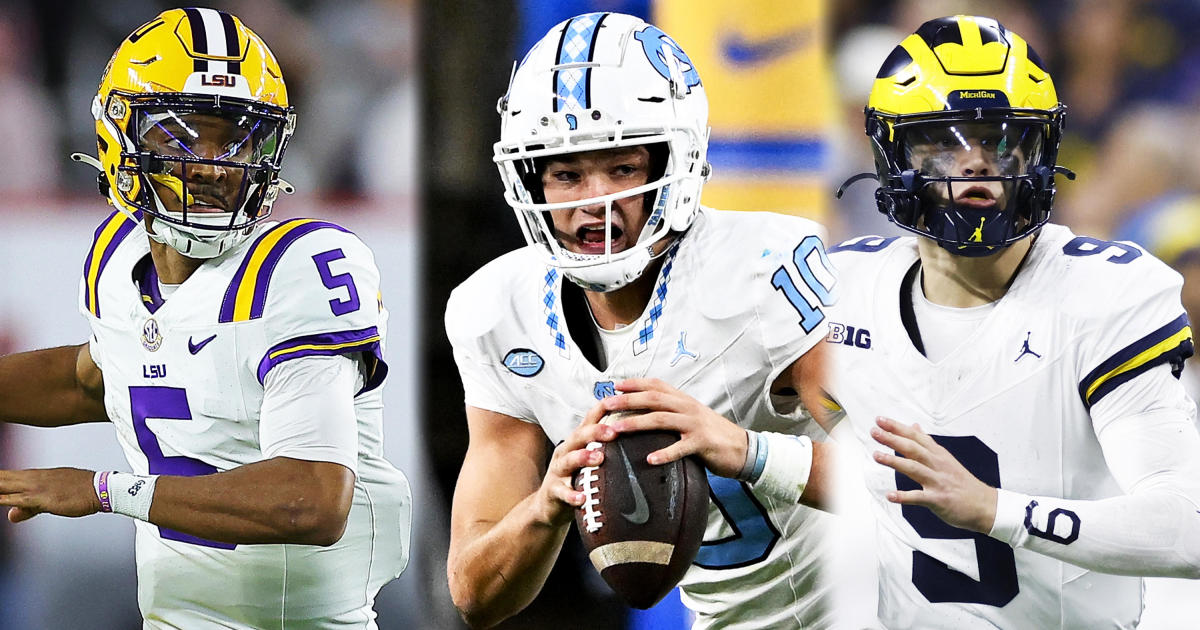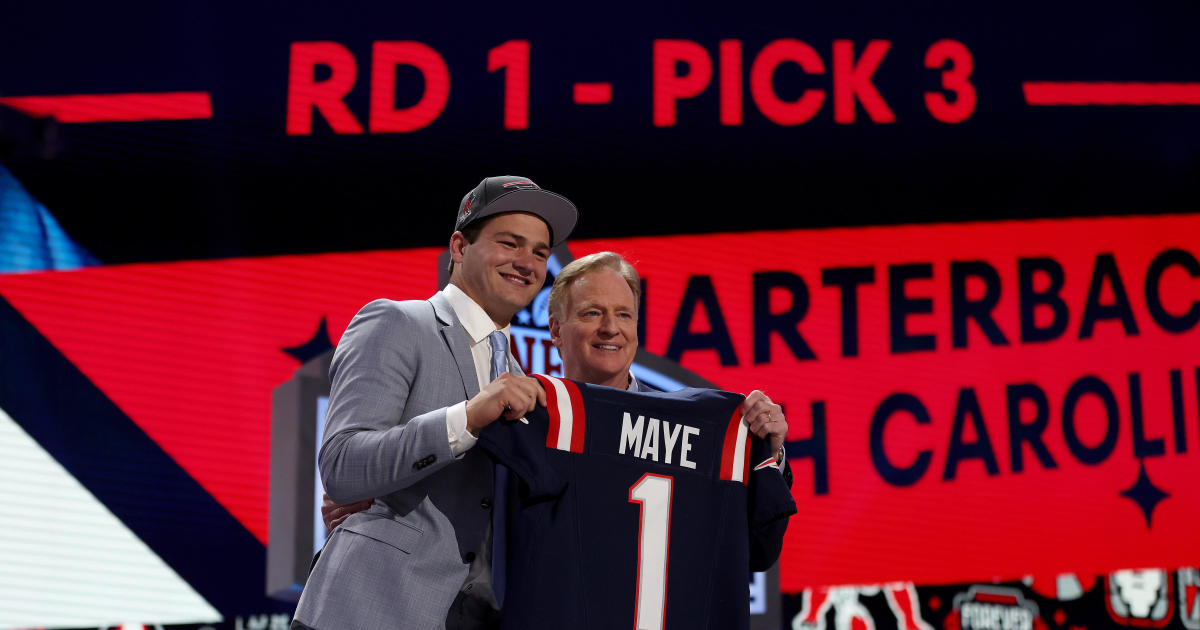How The Dolphins Beat The Falcons: Eight Keys Patriots Can Take Away For Sunday
By Michael Hurley, CBS Boston
BOSTON (CBS) -- There was a distinct point last Sunday afternoon when the present and future looked a little bleak for the New England Patriots. They were getting shredded by Josh McCown in New Jersey, while some 900 miles to the southwest, the Falcons were in the midst of blowing out the Dolphins with a 17-0 lead.
A quick glance at both scoreboards -- and the schedule, which showed a Falcons trip to Foxboro on tap for the following Sunday night -- surely led to some worrying among the Patriots' faithful.
But we know what happened next. The Patriots Patriots'd, and the Falcons Falcons'd. New England outscored New York 24-3 over the final 36 minutes of the game, while the Falcons allowed the Dolphins to score 20 unanswered points in the game's final 20 minutes en route to a surprising upset victory in Atlanta. It was a rather incredible collapse from a team that knows a thing or two about collapsing.
Still, for those of us who were otherwise occupied with the Patriots-Jets game, the result down in Atlanta remained difficult to fully comprehend. So I decided to take a look at what in the world happened that allowed the Dolphins to come back in that game and see what might actually apply when the Patriots host the Falcons this coming Sunday evening.
But first, a few tidbits:
In the entirety of his 12-year NFL career, Jay Cutler had never once rallied his team to a win when trailing by as many as 17 points in the second half of a game. He did it on Sunday.
Entering the second half on Sunday, the Dolphins had scored just one touchdown from scrimmage in their previous 10 quarters. They scored two touchdowns in the third quarter.
The Dolphins entered Sunday's game with zero interceptions through four games on the season. That's zero with a capital Z. Yet, with the Falcons already in position to kick a game-tying field goal in the final minute, Reshad Jones picked off a Matt Ryan pass to a well-covered Austin Hooper to cost Atlanta a chance to even force overtime.
The Falcons truly are incredible. After famously blowing a 28-3 lead in the Super Bowl, they spent all summer saying they were over it. Since then, they needed the Bears to drop a would-be game-winning touchdown and Golden Tate to get tackled with the football an inch shy of the goal line in order to earn two of their three wins. They've also lost at home in consecutive games to the Bills and the Dolphins.
Doesn't sound like they're over it. And a loss on national TV to the Patriots on Sunday night? It may confirm to the world that the Falcons are wrecked.
Given the way the New England defense has looked throughout the year, a Patriots victory is far from a sure thing. But that is what's at stake for the visiting Falcons.
OK, on to some information that might be applicable for that game.
The Falcons can't handle needing to gain long yardage for first downs.
This theme was pretty consistent all day long. If the Falcons took a negative play or committed a penalty that sent them into anything longer than a first- or second-and-10 situation, they were cooked.
On the opening drive, they failed on a third-and-10, but Xavien Howard committed an unnecessary pass interference penalty to keep the drive alive. That first Atlanta scoring drive was a gift from the Dolphins.
Early in the second quarter after a false start on first down, they faced a third-and-11. Matt Ryan threw a screen to Devonta Freeman, who was swarmed by Dolphins defenders for no gain.
With their lead cut to 17-7, the Falcons began their first drive of the second half by allowing a sack for a loss of five yards. Freeman ran for two yards on second down, and on third-and-13, Ryan completed a pass to Hooper over the middle, who was surrounded and tackled two yards shy of the first down. The Dolphins simply defended the first-down line and trusted their own tackling ability -- something the Patriots can do with Devin McCourty, Duron Harmon and Patrick Chung.
With their lead cut to 17-14, the Falcons responded well by driving quickly from their own 25 to the Miami 33. But on a first-and-10, Jake Matthews was called for holding. He's been known to commit an ill-timed holding penalty or two deep in opponents' territory from time to time. The Falcons couldn't recover. After Freeman ran for no gain, the Falcons forgot to block Cameron Wake:
On third-and-24, Ryan completed a five-yard pass to Hooper, and the Falcons had to punt. After making good progress into Miami territory, the Falcons started moving backward. Points off the board.
On the Falcons' next drive, after the Dolphins had tied the game midway through the fourth quarter, Tevin Coleman was tackled for an eight-yard loss on second-and-8. On third-and-16, Ryan fired a ball about a quarter-mile out of bounds. Another punt.
The bottom line: Most teams struggle when they need to gain more than 10 yards to pick up a first down. But in this game, the Falcons were especially bad. Considering the Falcons rank second in the NFL overall in third-down conversions, it'll be especially important for the Patriots to try to force Ryan into as many third-and-longs as possible. On the road, it'll be even more challenging than at home.
The Falcons can't stop a good, hard, downhill runner.
Jay Ajayi won this game for Miami.
Overall, his numbers stood out -- 26 carries for 130 yards. But watching the game, he was even better than that.
Granted, it helped when Atlanta gave him running lanes wide enough to fit a Mini Cooper:
Those are the types of holes that can be opened against a defense that is fast but perhaps not "big." And while the Patriots have averaged a very mediocre 4.0 yards per carry on the season, they'd be wise to try to ride some heavy personnel packages to try to run right at the Falcons. Yet given that all four Patriots running backs can operate out of the shotgun, the starting five offensive linemen may be asked to carry the load themselves, as it'll likely be easier to push around that Atlanta defense if they're defending what looks like a pass.
The Dolphins don't have four running backs, so they went with a heavy dose of Ajayi. On their second drive, Ajayi broke off consecutive runs of 15 yards, five yards, nine yards and six yards before he headed to the sideline for a breather. The drive collapsed without him. That was in part because Ajayi's backup, Damien Williams, hesitated behind the line of scrimmage and consequently found himself quickly surrounded by red jerseys.
That play was an indication that whoever gets the ball for the Patriots will need to pick a lane and hit it hard; waiting around does no good against the Falcons' defense.
The bottom line: The Patriots need someone to do a Jay Ajayi impression. Ajayi is 6-feet, 223 pounds. Mike Gillislee is 5-foot-11, 219 pounds. He's the best candidate. Maybe Rex Burkhead is healthy enough to play for the first time since Week 2. James White and Dion Lewis ought to figure in, too. Whoever it is that ends up getting the ball, he's going to be important. The ground game is a smart way to not only move the ball against the Falcons defense (20th in yards allowed per rush) but also control the tempo of the game. That's something the Patriots have struggled with all year, but they have the opportunity this week.
The Falcons struggled mightily on special teams, which proved costly.
We all too often ignore the importance of special teams. The Falcons sure did that on Sunday, and that's as big a reason as any whey they were handed a big fat L.
Here are the lowlights.
Kicker Matt Bryant missed a 59-yarder before halftime. Granted, 59-yarders are tough, but in today's NFL, indoors? Kickers should at least get it close. Bryant's kick was so short that Jarvis Landry was able to field it in the end zone and attempt a long return. Not a great kick at a time when it didn't look like points would be super critical for the Falcons.
Punter Matt Bosher booted a horrific 26-yarder midway through the third quarter. That mishit set up the Dolphins to start on their own 49-yard line. That's some 20-30 yards of free field position. The Dolphins capitalized, scoring a touchdown in just five plays on a penalty-aided scoring drive.
Long snapper Josh Harris snapped the ball off his butt early in the fourth quarter, leaving a loose ball for Bosher to scramble to pick up and try to carry forward. He's a punter, so that didn't work out. He was tackled well behind the line of scrimmage, thus setting up the Dolphins to start their drive at their own 48-yard line. Again, that was a free 20-30 yards of field position because of poor special teams execution, and the Dolphins gained just 21 yards on the ensuing drive. Because of that exceptional field position, those 21 yards were enough to get into field-goal range. Cody Parkey nailed the 49-yard field goal to tie the game.
And after the Dolphins had taken a 20-17 lead, Andre Roberts decided to take the kickoff out of the end zone. He got smacked at the 13-yard line, costing his team 12 yards of field position when they desperately needed at least a field goal.
Of the Dolphins' four scoring drives, they needed to go 51 yards on one of their touchdowns and just 21 yards on one of their field goals. The Falcons' special teams made it too easy for Miami.
The bottom line: Execution on special teams is generally a strength of the Patriots, and it will need to be again on Sunday night. If they're fortunate enough to catch one or two of these mistakes from Atlanta, it could swing the game.
Dan Quinn still struggles a bit with clock management.
Not every NFL head coach is excellent when it comes to managing the clock. And it was clear watching this game that Atlanta's Super Bowl catastrophe was no coincidence.
This time around, though, it was the opposite situation. Instead of needing to burn clock, the Falcons needed to preserve it. But, oddly, they didn't.
After Ajayi broke off an 18-yard run to get to the Atlanta 30-yard line, the Dolphins were in position to kick the go-ahead field goal. And after Cutler completed a pass to Landry to move the chains on a third-and-9 to set up the Dolphins at the Atlanta 19-yard line, it was very clear what was going to happen.
But the Falcons didn't call timeout, allowing 40 seconds to tick off the clock before the next play, and another 37 seconds to tick off the clock after a first-down run. Quinn did use Atlanta's first timeout after a second-down run, and the Dolphins helped out their opponent by throwing incomplete on third down to stop the clock at 2:35. Had the Dolphins played that one smarter, they'd have either taken it down to the two-minute warning or left Atlanta with just one timeout.
But Atlanta did have two timeouts for that final drive, and yet did not elect to use them.
It ended up working out for them -- they drove into comfortable field-goal range with time to spare and timeouts in their pocket -- but it created perhaps a needless sense of urgency, when they could have cushioned the timing a bit. Again, the Falcons executed their two-minute offense well and they were in position to tie the game with a field goal and potentially win it with a touchdown ... but the end result of the very-rushed drive was an interception to lose the game. Who knows how that drive might have gone if there was an additional minute on the clock?
You could argue that this is a stretch. But honestly, after that "Now Now Now Now" clock from the summer, there will always be some questions about Quinn's clock management.
The bottom line: As it was in February, the Patriots seem to have the advantage when it comes to game management from the sidelines.
The Falcons committed some dumb penalties.
The Patriots have had their issues with penalties this year, notably against Carolina and Tampa Bay, but the Falcons really shot themselves in the foot in grand fashion in this one.
Linebacker De'Vondre Campbell delivered an unnecessary helmet-to-helmet hit on Cutler, which negated an offensive pass interference penalty late in the second quarter.
On the very next play, rookie Takk McKinley shoved Jakeem Grant after the whistle, prompting a 15-yard unnecessary roughness penalty. It was a bit of a soft call, but McKinley certainly shoved the opponent when he didn't need to.
However the Dolphins let the Falcons off the hook when Cutler ended that drive with an interception. Atlanta wouldn't be so lucky later on.
Already gifted great field position after Bosher's terrible punt, the Dolphins were given 26 more yards when Robert Alford committed a completely unnecessary pass interference penalty on a bracketed Grant on a third-and-8 incompletion. It was a complete bailout penalty for the Dolphins, who would have had to punt if Alford had kept his hands to himself.
Two snaps later, Cutler threw an interception ... but it didn't count, because Grady Jarrett took two steps before hitting Cutler, thus drawing a roughing the passer penalty:
Unnecessary and unwise. And it cost his team a turnover. The Dolphins turned it into a touchdown.
This, ladies and gentlemen, is how you lose a football game while surrendering just 151 passing yards.
Later, there was also the aforementioned Matthews holding penalty, which helped take points off the board for Atlanta.
The bottom line: The Falcons are one of the least-penalized teams in the NFL, but when they go sideways, they really go sideways. Had they not committed any one of these unnecessary infractions, they probably would have won the game. There is an opening for the Patriots to try to poke the bear, so to speak, to try to goad them into some ill-advised decisions. However, the Patriots probably won't be relying on defensive pass interference penalties, as Gene Steratore's crew last season called the fewest penalties on defensive backs in the NFL.
The Falcons still struggle to cover receivers out of the backfield.
James White. Perhaps you've heard of him? He caught something like 45 passes for a million yards (actually, 14 for 110) in the Super Bowl? Well the Falcons will know he's coming this time around ... but they still might not be able to stop him.
As seen in a couple of critical plays vs. Miami, the Atlanta defense has its issues when it comes to picking up receivers out of the backfield.
The Dolphins ran a pretty snazzy motion play with receiver Jarvis Landry to score one touchdown. He motioned from the left side, trotted into the backfield as if he'd be taking an end-around, but then pivoted and turned 180 degrees at the snap.
He ran a route back to the left side of the field, where he was wide open:
Touchdown.
Earlier in the third quarter on the Dolphins' first touchdown drive, they needed to convert a third-and-4 at the Atlanta 33. Damien Williams lined up to Cutler's right in a shotgun formation. At the snap, he ran behind Cutler to run a swing pattern to the left side of the field. Cutler simply dumped it to Williams in space, who had one man to beat in Deion Jones. He beat him.
First down.
Later that same drive, Cutler threw to Williams on a quick out on third-and-5 for a gain of four. The Dolphins elected to go for it on fourth-and-1. Cutler ran a play-fake and ... threw to Williams.
Easy first down.
The bottom line: The Patriots killed the Falcons by using a running back as a receiver in the Super Bowl, and they should be able to do it again. The Falcons allowed Tarik Cohen to catch eight balls for 47 yards and a touchdown and Ty Montgomery to catch six balls for 75 yards and a touchdown, so the potential for another big game from White -- as well as Dion Lewis -- is there for the Patriots to exploit.
The Patriots' defense will have to play fast.
Part of Atlanta's offensive struggles came because Miami -- for the most part -- stifled Freeman and Coleman. Freeman did gain 68 yards on the day, but 44 of those came on one carry. He gained just 24 yards on his other eight carries. Coleman gained 32 yards on nine carries, but 20 of those came on a single run. He gained just 12 yards on his other eight runs.
Freeman and Coleman are exceptional runners, so stopping them isn't easy. But Miami was clearly committed to stopping the run, and the rest of the defensive performance worked itself out from there. A well-timed and impressive interception by Reshad Jones at the end sealed the win, but that commitment to selling out to stop the run helped put Miami in that position to begin with.
As a team, the Falcons really screwed up a key play.
Sometimes football is very complicated and sophisticated. Sometimes it's as simple as "tackle the man with the ball."
The Falcons' defense faced the latter situation on what turned out to be Miami's winning drive. They flunked the test.
On a third-and-9 at the Falcons' 29 yard line, Cutler threw short over the middle to Landry. After making the catch, Landry didn't have too many options with where he could run:
And yet somehow ... some way ... no Falcons stepped up and made the tackle. Landry fell forward across the 20-yard line for a fresh set of downs.
In football, we often identify various moments as "championship plays by a championship team." This was not one of those moments.
What's up with Falcons fans?
This has nothing to do with the upcoming game, but what's the deal with the Falcons fans down in that fancy new stadium? Here's how the crowd looked (or didn't look) during Atlanta's attempt to score before halftime:
Here's a crowd shot nearly five minutes into the second half:
OK, but maybe they've got some sort of weird halftime thing going on? You've gotta leave your seats early if you want to hit the bathroom and the concessions? Those low prices are sure to beget long lines, right?
Well, OK, then how do we explain the lack of crowd size in the final minutes, when Atlanta was driving to either tie or win the game?
What in the wide world of sports is going on down there?
Again, that has nothing to do with the Falcons' impending trip to Foxboro. Just couldn't help but notice that while watching.
In closing ...
That was admittedly a bit extensive, and nobody expects all of those scenarios to factor in to this coming Sunday's game. But it provides, at least, a glimpse into some of the vulnerable areas of a team that on paper has a high-flying offense but has struggled to make it all work this year.
Still, a number of things did work for Atlanta vs. Miami that could prove fruitful vs. New England. A fake end-around bomb to former practice squad receiver Marvin Hall that went for a 40-yard touchdown is one that just might work against a Patriots secondary that's had its own struggles. Julio Jones (six for 72 vs. Miami) remains a largely impossible cover. If Freeman breaks one more of those big runs, it's a different game. If Bosher and the punt unit function normally, things change. Etc., etc., etc.
So by no means is there an easy road map to victory for New England. Nevertheless, with a much better quarterback facing the Falcons this coming weekend, the prospect of picking up a win at home against the Falcons looks a whole lot more realistic now than it did last Sunday around 1:40 p.m.
You can email Michael Hurley or find him on Twitter @michaelFhurley.
